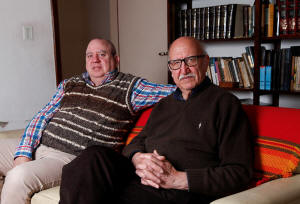In Argentina, three generations of a Peronist family weigh their vote
 Send a link to a friend
Send a link to a friend
 [November 18, 2023]
By Lucinda Elliott and Horacio Cordoba [November 18, 2023]
By Lucinda Elliott and Horacio Cordoba
RIO GALLEGOS, Argentina (Reuters) - Catalina Cepernic's
great-grandfather Jorge, a sheep-farm owner in Argentina's windswept
Patagonia, was the first member of the family won over to the ideas of
Juan Domingo Peron, the former president who spawned the country's most
powerful political movement.
Peron's calls in the mid-1940s for better working conditions, wages and
state pensions resonated with Jorge, his family recounted, as he
listened to the charismatic leader's speeches on the radio from his farm
in this remote corner of South America.
The Cepernics remain a Peronist family, three generations of the clan
told Reuters, but their support for the movement has faltered. That
could be a warning sign ahead of Sunday's presidential election, which
opinion polls suggest will be a close contest and where the Peronist
government faces being toppled by a radical libertarian outsider.
Catalina, 27, plans to back the Peronists, but said many in the family,
who still live in and around the original farm, would cast blank votes,
confirmed in interviews with her father, aunt and her grandfather, the
son of the late Jorge.
"Maybe a few will vote for Peronism," she said from her home in the
province of Santa Cruz.
Peronism has sought to preserve the social justice pledges of Peron, but
it is a nebulous and shifting movement that over the decades has
selected its policies from across the ideological spectrum. It has ruled
Argentina for over half the time since Peron's first presidency in the
1940s, and has been the ruling power currently since 2019.

Now its presidential candidate, Economy Minister Sergio Massa, faces the
real prospect of defeat in Sunday's run-off vote against Javier Milei, a
far-right libertarian who wants to reduce the size of the state and
"detonate" the political status quo.
That comes amid the country's worst economic crisis in some two decades,
with inflation at 143%, two-fifths of Argentines in poverty and a
recession around the corner. Many blame the economic woes on the
Peronists, especially the movement's powerful left-wing.
Even traditional Peronist supporters are apathetic.
Catalina remembers the excitement, age 7, accompanying her
great-grandfather to vote. Now she feels disillusioned and says she is
only supporting the Peronists out of fear of Milei, citing his plan to
limit access to abortion.
"At home, politics was always present before," she said. "Today I don't
identify with Peronism and I'm not sure if their policies reflect what
my relatives fought for all those years ago."
'REFLECTION OF SOCIETY'
Marcela Cepernic, 52, Catalina's aunt, said over the years she has
mostly voted for Peronism and left-wing parties, but in this election
"does not have the stomach" to support Massa due to the country's dire
economic situation.
"I grew up in a Peronist family, and I'm planning to vote blank,"
Marcela, a retired school teacher, said from the ice cream parlor she
now runs in El Chalten, a village in Santa Cruz province.
She cited a regular refrain that Massa, 51, was too much a politician of
all stripes - something that has been used both to criticize him as
inconsistent and to praise him as flexible and willing to reach across
the political aisle.
"Massa is sometimes a Peronist, sometimes not, he's neither left nor
right. He is whatever he wants to be, switching between parties," she
said.

[to top of second column]
|

Juan Manuel Cepernic and his father Marcelo pose for a photo at
Marcelo's home, in Rio Gallegos, Argentina, November 14, 2023.
REUTERS/Horacio Cordoba

The family's loss of political fervor over time is illustrative of
an important change in Argentina, as activism has turned to
resignation.
"Our family in a way is a reflection of society," Juan Manuel
Cepernic, 54, Catalina's father, said from the city of Rio Gallegos,
a windy, cold transport hub that is the capital of Santa Cruz. "My
children don't really want to participate in politics."
The Santa Cruz region is a stronghold of Peronist former presidents
Cristina Fernandez de Kirchner and the late Nestor Kirchner, a
husband-and-wife pair who governed from 2003 to 2015. The Kirchners
have been the dominant political force within Peronism since the
turn of the century, though their populist agenda sharply divided
opinion and their power base is waning.
Peronism now felt "devoid of content," said Juan Manuel.
He preferred not to disclose his planned vote, although he added,
"I'd never vote for Milei in my life."
"It's all personalities wanting to stay in power," he said.
'ALL OF US SUPPORTED PERONISM'
The Cepernics' lives have been intertwined with Peronism. A local
state-run hydroelectric dam project, backed by Chinese finance, is
dedicated to the memory of old Jorge Cepernic, who died in 2010.
From his farming roots he became a Peronist advocate and later Santa
Cruz governor in 1973 during Peron's third presidency.
Jorge was imprisoned during the 1976-1983 dictatorship when the
military junta attempted to erase all traces of Peronism from public
life.
"I remember knowing as a young boy that my grandpa was in jail
because he thought differently," said Juan Manuel.
When democracy was restored in 1983, everyone in the family
supported the Peronist movement.
Jorge's son Marcelo ran as the Peronist candidate for city mayor of
Rio Gallegos that year and won, serving until 1987.

Marcelo, now 78, later campaigned to bring about justice for human
rights violations committed by the military during the dictatorship.
Milei's vice-presidential running mate Victoria Villarruel has
questioned those trials and defended military officers convicted of
crimes against humanity.
"Milei frightens me," Marcelo told Reuters. However, for the first
time in 40 years of democracy he plans to vote blank rather than for
Massa. He admitted that felt like betraying his civic duty, given
the family history.
"For me Massa is a great imposter, he was originally part of an
extreme right party," Marcelo said. "Milei is absolutely unbalanced,
and I don't want to be responsible for either of the two governing
the country."
Marcela, his daughter with the ice cream parlor, said there was some
disappointment in the family that their generation was not so
politically active, but she felt that no party today truly reflected
her aspirations.
"We have politics in our veins, but there is no longer a space that
represents me," she said.
(Reporting by Lucinda Elliott in Buenos Aires and Horacio Cordoba in
Rio Gallegos; Editing by Adam Jourdan and Rosalba O'Brien)
[© 2023 Thomson Reuters. All rights
reserved.]This material
may not be published, broadcast, rewritten or redistributed.
Thompson Reuters is solely responsible for this content. |